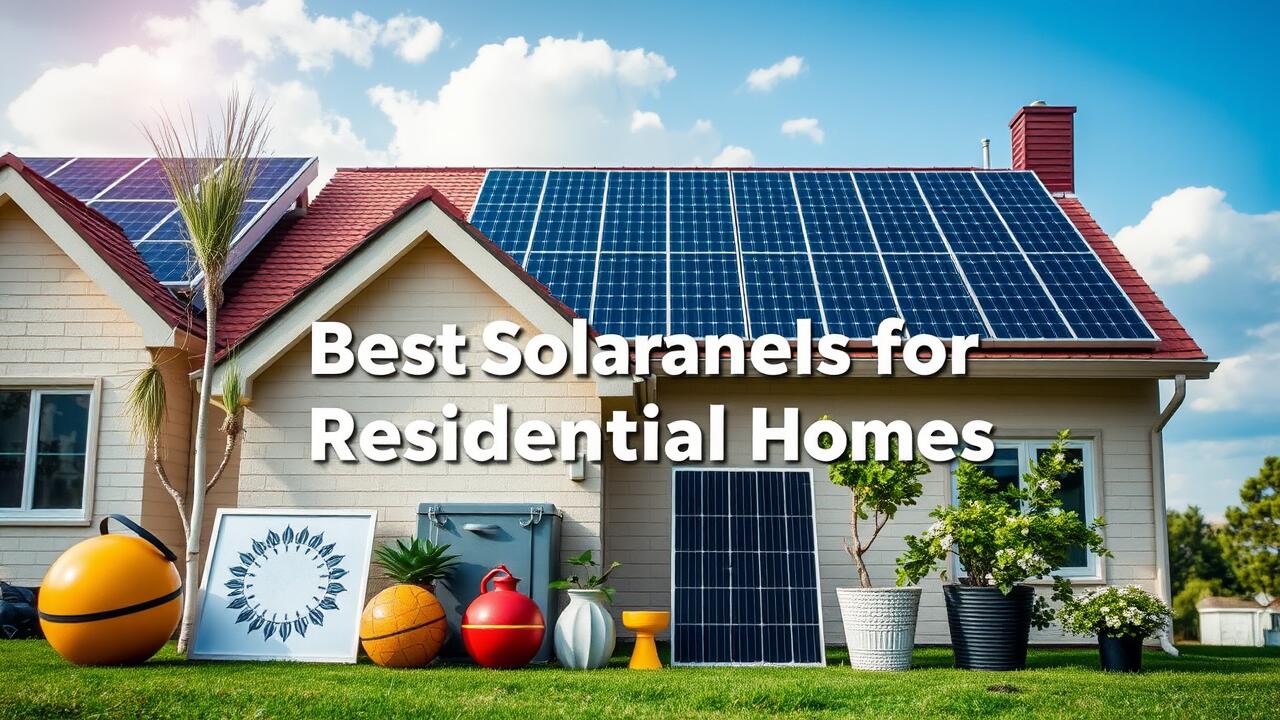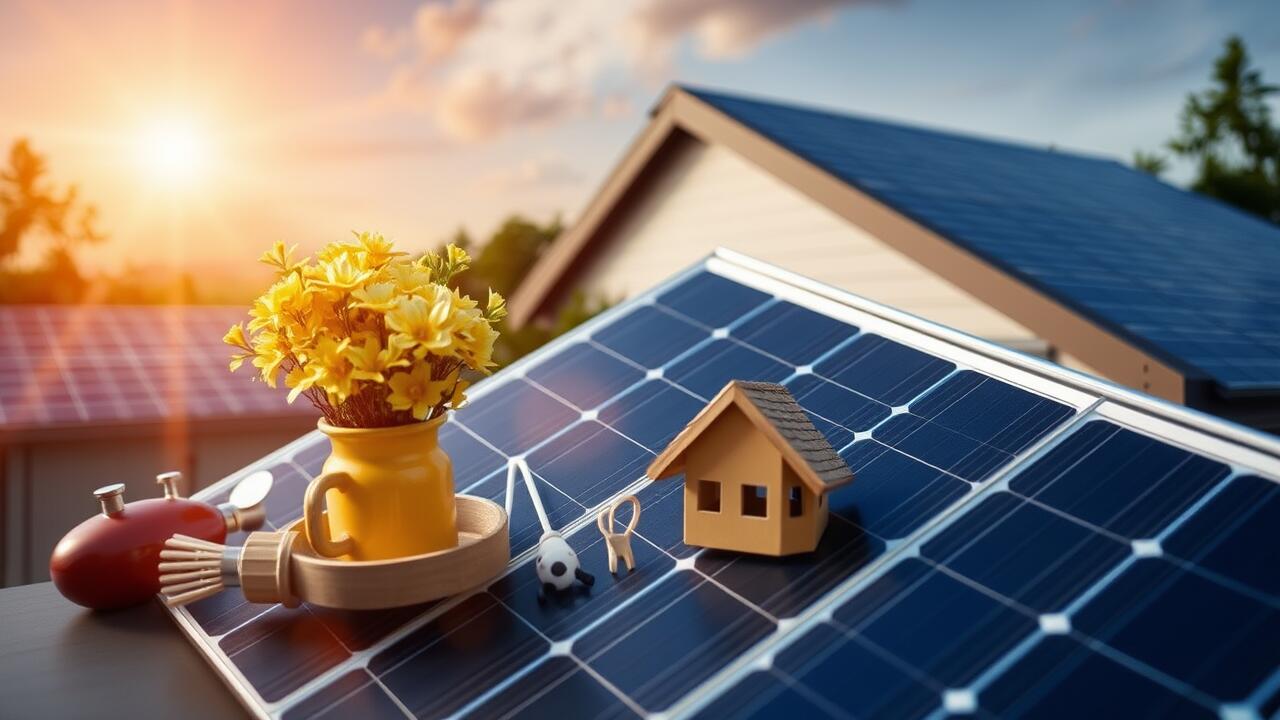Table Of Contents
Understanding Solar Panels
Solar panels play a crucial role in harnessing solar energy for residential use. They come in various forms, including monocrystalline, polycrystalline, and thin-film technologies, allowing homeowners to choose the best fit for their needs. Rooftop solar panels are a popular choice, integrating seamlessly into home designs while generating power for a home solar energy system. Transparent solar panels and solar tiles are innovative alternatives that offer aesthetic appeal along with functionality. Community solar initiatives provide options for those unable to install panels on their properties, ensuring broader access to renewable energy. Understanding these technologies is essential for selecting the Best Solar Panels for Residential Homes that maximize efficiency and benefits.

What Are Solar Panels?
Solar panels are essential components of solar photovoltaic (PV) systems, converting sunlight into electricity. This technology harnesses solar energy through various innovations, including the popular thin-film solar panels and advanced solar photovoltaic technology. Homeowners looking to invest in renewable energy often seek the best solar panels for residential homes to maximize energy efficiency and reduce utility bills. These solar systems can be installed on rooftops, making them a practical choice for residential properties.
The landscape of solar technologies offers a range of options for consumers, including some of the cheapest solar solutions available. These systems cater to varying energy needs and budgets while maintaining effectiveness in light conversion. As one explores the best solar panels for residential homes, it becomes clear that understanding the different types of solar PV technology and their capabilities is crucial for making informed decisions about energy production and sustainability.
How Solar Panels Work
Solar panels convert sunlight into electricity through photovoltaic cells. These cells capture solar energy and generate direct current (DC) electricity. An inverter then transforms this DC electricity into alternating current (AC), which powers homes. The best solar panels for residential homes can be installed on rooftops or integrated into building designs, utilizing technologies like building-integrated photovoltaics. This innovation allows for aesthetics alongside functionality, promoting the use of solar power in various structures.
Solar technology continues to evolve, making solar electricity more accessible and affordable. The emergence of cheaper solar options, like roof tiles, offers homeowners attractive choices without sacrificing performance. Utility-scale solar installations also contribute to the growing reliance on solar energy, driving the demand for effective solutions in residential settings. With this increasing focus on sustainability, residential solar panels are becoming a top choice for energy-conscious consumers seeking to harness solar electricity efficiently.
Factors to Consider When Choosing Solar Panels
Selecting the right solar panels involves evaluating several important criteria. Efficiency ratings of solar cells play a crucial role, impacting the overall performance of your solar power systems. Looking into brands recognized by the Solar Energy Industries Association can help identify the best solar panels for residential homes, as some manufacturers like Solaria and Solaredge are known for their high-quality offerings. Budget considerations should align with performance expectations, taking into account both the initial costs and potential long-term savings. Understanding the different types of solar arrays, along with their respective solar cell efficiency, can help homeowners make informed choices that best suit their energy needs.
Efficiency Ratings
Efficiency ratings play a crucial role in determining the Best Solar Panels for Residential Homes. High-efficiency panels convert a larger portion of sunlight into usable electricity using advanced photovoltaic (PV) technology. Manufacturers like Canadian Solar and JA Solar have made significant strides in utilizing cutting-edge photovoltaic materials to enhance performance. The efficiency of these panels often correlates with the type of solar inverter used, which optimizes energy conversion rates, ensuring maximum output as sunlight conditions fluctuate.
Evaluating the efficiency ratings of solar panels not only influences immediate performance but also impacts long-term savings and energy independence. Concentrating solar power technologies and high-efficiency solar batteries can complement traditional photovoltaic setups, enriching the overall energy ecosystem of a home. Investing in the Best Solar Panels for Residential Homes with superior efficiency ensures that homeowners benefit from reliable photovoltaic power, reducing their carbon footprint while enjoying financial savings over time.
Cost and Budget
Budget considerations play a crucial role in selecting the best solar panels for residential homes. Prices for residential solar panels can vary significantly based on factors such as panel efficiency, brand, and installation costs. While higher efficiency models may come with a higher price tag, they often provide better energy output over time. Homeowners should evaluate their energy needs and financial situation before diving into the residential solar market to ensure they choose the right option for their budget.
Long-term investment is another aspect to consider for solar homes. While the upfront costs of installing residential rooftop solar can be substantial, the savings on electricity bills can accumulate significantly over the years. Moreover, tax incentives and rebates are available in many areas that can help offset the initial expense of purchasing residential panels. Understanding these financial dynamics is essential for making informed decisions about deploying the best solar panels for residential homes.
| Solar Panel Brand | Efficiency (%) | Estimated Cost ($) | Warranty (Years) | Potential Savings Over 20 Years ($) |
|---|---|---|---|---|
| SunPower | 22.7 | 3,000 | 25 | 20,000 |
| LG Solar | 21.0 | 2,800 | 25 | 18,000 |
| Canadian Solar | 19.9 | 2,200 | 25 | 15,000 |
| Trina Solar | 19.5 | 1,900 | 10 | 12,000 |
Best Solar Panels for Residential Homes
Home solar basics emphasize the significance of selecting the right solar panels for optimal performance and savings. For many solar homeowners, monocrystalline solar panels are generally considered the best choice for a residential property due to their high efficiency and space-saving design. While standard solar panels also offer benefits, the advanced technology of monocrystalline options can yield more energy in less time. Understanding how solar panels work is essential for making informed decisions, especially when exploring residential solar financing options. A solar-equipped home not only enhances property value but also provides long-term savings on energy bills. As you navigate the landscape of solar panels today, having the right solar panels contributes significantly to the overall effectiveness of your investment in home energy solutions.

Top Brands in Home Solar Panels
Leading brands in the rooftop solar market have made significant strides in creating efficient solar panels for residential homes. Companies like SunPower, LG, and Canadian Solar are recognized for their high-performance products that enhance home solar energy generation. Their residential panels are designed to maximize output, making them ideal for homeowners looking to invest in a whole-home solar system. By opting for these top-rated solar panel options, homeowners can ensure they receive the best solar panels for residential homes available.
Several of these brands also offer appealing warranties and customer support, which are crucial for successful solar panel installations. SunPower, for instance, is known for its robust warranties and long-lasting efficiency, attracting homeowners interested in installing a comprehensive rooftop solar system. As the solar roof technology evolves, many brands are expanding their product lines to include versatile rooftop panels, ensuring that homeowners can find the perfect fit for their energy needs and budget within the solar panel market.
Note: The information provided reflects the state of the solar panel industry as of October 2023.
Comparison of Features and Benefits
Choosing among the Best Solar Panels for Residential Homes requires careful consideration of features and benefits. Various solar panel types offer distinct advantages that cater to different needs. Tier-one rooftop solar typically signifies higher quality and reliability, appealing to homeowners looking for longevity. The solar panel look can also impact aesthetic preferences on residential roofs. Understanding the differences between identical solar panels can help consumers make informed decisions based on their specific requirements and investment opportunities.
Analysis of features and benefits provides insight into the offerings from different solar panel manufacturers and solar providers. The performance, efficiency ratings, and warranty offered often vary among the solar panel types. Some options may provide better output over a shorter installation period, while others are suited for specific climates or energy needs. By comparing these aspects, homeowners can determine which model aligns with their goals, ensuring they select the Best Solar Panels for Residential Homes that meet both financial and lifestyle preferences.
Types of Residential Panels
Understanding the various types of solar panels is essential for homeowners looking to invest in the best solar panels for residential homes. Monocrystalline, polycrystalline, and thin-film solar panels each offer different advantages and efficiencies, making it crucial to consult with a knowledgeable solar panel installer to determine the solar panel right for your specific needs. Each solar panel model comes with its own set of efficiency ratings and aesthetic qualities, influencing the overall performance of the solar panel system. Choosing a reputable solar panel manufacturer ensures quality and reliability, which impacts the lifespan and effectiveness of your solar setup. By weighing these factors, homeowners can make informed decisions regarding solar installations that align with their budget and energy goals, while maximizing the potential of their solar panel supply.
Monocrystalline Solar Panels
Monocrystalline panels are a popular choice among solar buyers seeking the best solar panels for residential homes. Their efficient design, featuring silicon cells made from a single crystal structure, allows them to convert sunlight into electricity more effectively than other types. Due to their high efficiency and longevity, they often represent a higher upfront cost but can result in significant savings over time. Homeowners looking into solar installations frequently find that investing in a reputable solar panel brand can enhance their overall experience and maximize their return on investment.
The solar panel industry recognizes the importance of technology advancements in monocrystalline panels, which are often regarded as the most efficient option available today. A good solar installer can help consumers navigate the solar marketplace, offering insights on the best options tailored to specific residential installations. Understanding solar panel costs associated with these panels and their installation can influence decisions, but many homeowners find the benefits far outweigh the initial investment. With a growing number of solar installers familiar with this technology, the accessibility of these panels continues to improve for all interested in harnessing solar energy.
| Brand | Efficiency (%) | Wattage (W) | Warranty (Years) | Price Range ($) |
|---|---|---|---|---|
| SunPower | 22.8 | 450 | 25 | 250 – 300 |
| LG | 22.0 | 380 | 25 | 200 – 280 |
| Canadian Solar | 21.5 | 410 | 25 | 180 – 240 |
| Trina Solar | 20.3 | 400 | 15 | 150 – 210 |
Polycrystalline Solar Panels
These panels are recognized for their cost-effectiveness, making them a popular choice among solar shoppers. While they generally have a lower efficiency rating compared to their monocrystalline counterparts, they offer a solid balance between performance and solar panel cost. Homeowners in solar states like California often consider them for various solar projects. Ideal solar panel angle and proper installation can maximize their efficiency, contributing to the overall success of solar initiatives.
Canadian solar panels, a key player in the market, produce polycrystalline options that cater to diverse residential needs. They require minimal maintenance, but regular solar panel cleaning can enhance their performance over time. For families searching for the Best Solar Panels for Residential Homes, polycrystalline panels present an attractive combination of affordability and reliability in harnessing solar energy effectively.
Thin-Film Solar Panels
Thin-film technology offers an efficient solution for those seeking the Best Solar Panels for Residential Homes. This type of panel is manufactured using a variety of materials that allow for a flexible and lightweight design. This adaptability makes them suitable for various rooftops and residential properties, even where traditional panels may not be feasible. While the solar panel output of thin-film options may be lower compared to monocrystalline and polycrystalline alternatives, they compensate with lower solar installations cost and easier integration into existing structures, fulfilling solar energy needs effectively.
For homeowners considering thin-film options, consulting with solar experts and a reputable solar installer is essential. They can provide insights from platforms like solarreviews to help evaluate the suitability of thin-film panels for specific applications. As the demand for diverse solar solutions grows, thin-film technology remains an attractive choice for those looking to balance aesthetics, functionality, and budget in their quest for the Best Solar Panels for Residential Homes.
Benefits of Installing Home Solar
The increasing adoption of solar energy has become a vital trend in the solar industry, offering numerous benefits for homeowners considering a transition to renewable energy sources. Best Solar Panels for Residential Homes not only provide significant long-term savings but also contribute to reducing the environmental impact associated with traditional energy sources. Solar customers can benefit from various financing options, including solar leases and solar power purchase agreements (PPAs), which allow for a more manageable upfront investment. As solar panel converts raise their households’ solar capacity, communities can foster solar-friendly policies that support sustainable energy initiatives. By choosing to install solar systems, homeowners contribute to a cleaner environment while enjoying the advantages of modern solar technology.
Long-Term Savings
Investing in solar panels offers significant long-term savings for homeowners. According to a solarreviews study, properties equipped with solar energy technologies can reduce their electricity bills substantially. Homeowners can maximize the efficiency of the Best Solar Panels for Residential Homes by considering their roofs’ orientation and slope. Many solar companies offer financing options and incentives that make solar installations financially attractive, especially under supportive solar policies. Potential solar customers should evaluate various energy needs and long-term financial benefits before committing.
The integration of solar tiles acts as a stylish alternative to traditional panels while also ensuring efficiency. Research conducted in the field of solar energy reveals that residential installations can lead to increased property values. Leading solar companies provide comprehensive packages that cover installation and maintenance, ensuring homeowners enjoy the benefits for years. As the solar space continues to evolve, investing in the Best Solar Panels for Residential Homes remains a savvy choice for those looking to secure their energy future.
- Lower electricity bills over time due to reduced reliance on grid power
- Potential tax credits and rebates that can offset initial installation costs
- Increased home resale value as solar installations are attractive to buyers
- Protection against rising energy prices, ensuring long-term budget stability
- Environmental benefits through reduced carbon footprint and reliance on fossil fuels
- Access to renewable energy, contributing to a sustainable future
- Enhanced energy independence by generating power on-site
Environmental Impact
The shift towards renewable energy sources, like solar power, significantly reduces greenhouse gas emissions. Homeowners who install solar systems contribute to a cleaner environment, making it beneficial for both individual residential properties and the community. Best Solar Panels for Residential Homes not only provide an effective solar solution but also ensure compliance with solar access laws, promoting sustainable energy practices. As more people adopt this technology, the positive impact on air quality and ecological preservation becomes increasingly evident.
Installing solar panels on rooftops represents a proactive approach to combating climate change. Many top solar brands offer efficient systems that ultimately save homeowners money while supporting ecological balance. With various financing options like solar loans, homeowners can invest in the Best Solar Panels for Residential Homes without overwhelming financial burdens. The trend towards solar solutions reflects a growing awareness of the importance of sustainable living, making residential installation a vital part of future urban planning.
Installing and Maintaining Home Solar Panels
The installation and maintenance of a solar energy system can significantly impact its performance and efficiency. Regional solar companies often recommend products like Maxeon, which offers the best solar panels for residential homes. These panels can include options such as polycrystalline solar panels that provide reliable energy capture. Proper installation ensures optimal integration with solar storage solutions, allowing homeowners to maximize energy savings. Understanding the intricacies of solar equipment and the impact of regular maintenance is essential in sustaining a functional solar energy system. Engaging with experts in the solar energy industries can offer invaluable insights for ensuring your solar power purchase aligns with long-term goals.
Installation Process Overview
The installation of solar panels begins with a thorough assessment of the property. This involves evaluating factors such as roof orientation, pitch, and shading. South-facing roofs typically provide the best exposure to sunlight, maximizing the effectiveness of the installed panels. Homeowners should also consider local solar prices and any available solar system financing options that can facilitate the investment. Understanding how the solar system component fits into the overall residential system can help ensure that the chosen installation meets energy needs effectively.
After assessing the site, the installation team will proceed with the mounting of the panels, followed by connecting the system to the electrical grid. This process requires careful planning to ensure that the solar panel performs at its optimal level. Once installed, the solar panel payback period can begin, allowing homeowners to start enjoying significant solar savings. Choosing the Best Solar Panels for Residential Homes can also enhance efficiency and performance, contributing to long-term energy independence.
- Conduct a comprehensive site assessment to determine optimal panel placement.
- Evaluate roof orientation, pitch, and shading to maximize sunlight exposure.
- Investigate local solar prices and financing options available for homeowners.
- Plan the installation timeline and logistics for mounting panels securely.
- Connect the solar system to the electrical grid with precision and care.
- Monitor the system post-installation to ensure it operates efficiently.
- Educate homeowners on maintenance and performance tracking for sustained savings.
Maintenance Tips for Longevity
Regular maintenance is essential to ensure the longevity of your solar panel system. Home installations benefit from routine inspections to check for debris accumulation or shading from nearby trees. Keeping solar panels clean maximizes solar power generation efficiency, making it crucial to follow the manufacturer’s guidelines outlined in your solar panel warranty. Understanding solar rights provisions can also help homeowners maintain optimal performance, protecting their investment and encouraging solar development in the community.
Investing in the best solar panels for residential homes can pay off significantly over time. Solar energy loans and financing options are available for upgrades or maintenance, ensuring that systems remain in top condition. Utilizing solar energy resources effectively not only enhances power generation but also allows homeowners to take full advantage of available incentives. Staying informed about solar business developments and local solar outlines can aid in optimizing your system for maximum efficiency and sustainability.
Conclusion
Choosing the best solar panels for residential homes involves careful consideration of various factors such as efficiency ratings, cost, and the specific energy needs of the household. Solar investment not only provides potential long-term savings through reduced energy bills but also contributes positively to the environment. Engaging with solar co-ops can enhance insights into community-driven solar projects that may benefit those with varying solar-adopter incomes. Understanding solar production and exploring available solar loans can facilitate a smoother transition to renewable energy. For those interested in commercial rooftop applications or solar generators, selecting high-quality panels is essential for optimal performance and longevity. The growth of the solar energy business continues to offer diverse options for homeowners, ensuring that investing in solar aligns with both personal and environmental goals.
FAQS
What are the benefits of installing home solar panels in residential properties today?
Installing home solar panels offers several advantages, including reduced electricity bills, increasing the efficiency of your solar photovoltaic systems, and enhancing your property’s value. With advancements in solar panel technology, such as high-efficiency solar panels and innovative solar inverters, homeowners can optimize their solar pv system for maximum energy output. Many companies are offering solar battery solutions that enable you to store excess energy for later use, further increasing the potential savings. Moreover, with the help of top solar companies and programs like solar ppa, solar adoption is becoming more accessible for residential systems across the country, making it easier than ever to own solar panels that best suit your needs.
How do solar panel systems differ in terms of efficiency for residential properties today?
The efficiency of solar panel systems for residential properties today can vary significantly depending on the solar panel models used. Factors such as solar photovoltaics and their design affect their output, and different solar businesses may offer various options at differing levels of solar panel efficiency. In California solar markets, for instance, solar system qualifies for significant incentives based on their performance, with brands like Maxeon offering the best solar panels in terms of reliability and efficiency. Solar energy research continues to advance, enabling better solar energy solutions tailored for residential properties today, and the overall impact solar systems have can also depend on the installed solar panel manufacturing quality.
What factors should homeowners consider when choosing solar energy systems for their residential homes?
When homeowners are selecting solar energy systems, it’s essential to consider how the efficiency of solar panels varies, the capacity of complete solar solutions, and the reputation of brands, such as Maxeon, which offers the best solar panels. Ultimately, the choice of solar panels depends on individual energy needs and budget considerations.
How do I determine if Maxeon offers the best solar panels for my residential homes?
Choosing the best solar panels for your residential home depends on various factors. One significant option to consider is Maxeon, as it is known for offering high-quality solar solutions. Evaluating the efficiency, warranties, and customer reviews associated with solar panels will help you determine if Maxeon offers the best solar panels for your specific needs.
How does the effectiveness of solar installation vary for different residential properties?
The effectiveness of solar installation can vary significantly because solar depends on factors such as location, roof orientation, and available sunlight. Therefore, how well the solar system performs and whether it provides the best value for homeowners is contingent upon these variables. So, understanding that solar isn always suitable for every home is crucial when making a decision.




